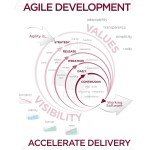Leadership Tip: Focus on Effectiveness, Not Efficiency
Many of us focus on how efficient we can be. Many of our organizations want to maximize our output for every minute and hour of work. However, if we focus on effectiveness first, we create better outcomes for everyone. We don’t waste time working on things that don’t matter.
An Example of Moving from Efficiency to Effectiveness
Danielle, a director, saw the effects of this problem. She wanted to reduce the number of projects in the project portfolio. The IT department had 400 people and 100 current projects. Everyone was multitasking—personally and in their teams. She and her fellow directors, met with Charlie, the CIO to discuss the portfolio and what they could do.
Charlie said, “We’re not getting enough done. I want to measure everyone’s velocity so I know they’re working hard.”
Danielle said, “They’re all working hard—some to the point of burnout. The problem isn’t personal or team velocity. The problem is they have too much WIP (Work in Progress). They’re multitasking so they can’t finish anything. We’re focused so much on efficiency, that we haven’t decided what not to do. We’re not focused on what makes us effective for our customers.”
They discussed the problem more. Finally, Charlie agreed to review the project portfolio the following week. He asked Danielle to present at the meeting.
At the project portfolio meeting, Danielle said, “We have too many projects underway. We’re too slow at finishing them. That’s because we’re multitasking all over the place. At a first cut, I think we can cull the number of projects from 100 to 20.”
After the room settled down, Danielle said, “If you can decide which 20 projects you want us to focus on, we might have to reorganize some teams. But then, we’ll be much more effective. Which projects do you want us to do?”
The managers decided on the first 15 projects within 30 minutes. After another 30 minutes of discussion, Danielle said, “We can just do these 15 projects. We will reorganize the teams to see if we can finish each project. I don’t know that we can. But we’ll try.
One of the portfolio managers asked, “How long do you need?”
Danielle said, “How about if we show you where we are a month from now and you can decide again?”
Everyone agreed.
A month later, the IT department had finished just 7 of those projects. However, revenue increased because the company was able to attract and retain more customers.
Ways to Think About Effectiveness
Here are ways I think about effectiveness:
- What are the most important things I can do now to create the most valuable outcomes?
- Who do I need to finish that work?
- What are the fewest outcomes that matter?
Effectiveness focuses us on what matters—the right things. Efficiency focuses on reducing the cost or time of the work—doing things right.
And that example of the portfolio team knowing which are the top 10% or so of the projects? That works best when the managers have an overarching goal. However, even if the managers don’t have a common goal, most people know the most valuable work.
I like efficiency ideas that reduce a team’s cycle time—reducing the friction to achieve a more valuable outcome. Some ideas:
- Streamlining the build and deploy systems, to reduce lead time.
- Seeing bottlenecks in the team, to reduce cycle time.
- Integrating refactoring practices in the team. For management, that might be about reframing decisions as experiments so you can try them and see what happens.
Which matters more?
My experience is that the organization delays outweigh any team-based delays. (See Why Minimize Management Decision Time.)
When we focus on the few things we need to do now we will see the most valuable outcomes. Once we know what those are (and when we need to decide again), we can work on the efficiency. (See Reduce Friction.)
That’s because different outcomes require different efficiencies. Only your team can see its efficiencies for your context.
Start with Effectiveness
When we start with effectiveness, we look for the most valuable outcomes. We work on what matters most to produce useful outcomes.
When we focus on efficiency first, we might work on “the wrong things righter” according to Russell Ackoff.
Effectiveness first, efficiency second. And of course, iterate.
This tip is mostly from Practical Ways to Lead an Innovative Organization.
This is a part of the series of intermittent leadership tips.
Published on Java Code Geeks with permission by Johanna Rothman , partner at our JCG program. See the original article here: Leadership Tip 12: Focus on Effectiveness, Not Efficiency Opinions expressed by Java Code Geeks contributors are their own. |



